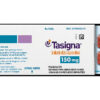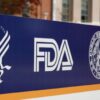The FDA is withdrawing approvals of 2 medications, Trilipix (fenofibric acid) and Niaspan (niacin extended-release), that are supposed to be taken along with statins to reduce high cholesterol levels because there is a lack of post-marketing evidence that the drugs have any significant cardiovascular benefit.
The FDA’s action, which is highly unusual, was made public in a notice in the Federal Register published today.
“Based on the collective evidence from several large cardiovascular outcome trials, the agency has concluded that the totality of the scientific evidence no longer supports the conclusion that a drug-induced reduction in triglyceride levels and/or increase in HDL-cholesterol levels in statin-treated patients results in a reduction in the risk of cardiovascular events,” the FDA states in the notice.
“Consistent with this conclusion, FDA has determined that the benefits of niacin ER tablets and fenofibric acid [direct-release] capsules for coadministration with statins no longer outweigh the risks, and the approvals for this indication should be withdrawn,” the document reads.
The FDA furthers says that that the manufacturers of the drugs must discontinue marketing the drugs for the reduction of cardiovascular risk indications. Abbvie is the original developer of all the medications included in the notice.
Trilipix, which was approved in 2008, is indicated to be taken in addition with a statin and changes in diet to reduce triglycerides, a type of fat in the blood, and increase HDL cholesterol (better known as “good cholesterol”) levels in people with mixed dyslipidemia (high LDL, or “bad cholesterol,” and high triglyceride levels) in people with chronic heart disease or are at high risk for it.
Niaspan won approval in 1987 and is indicated for use in combination with lovastatin and simvastatin for hyperlipidemia and mixed dyslipidemia to increase HDL and lower LDL and triglyceride levels in patients for whom treatment with Niaspan or one of the statins alone is insufficient. In addition, it is approved for patients with a history of myocardial infarction and hyperlipidemia to reduce the risk of another heart attack.
However, Niaspan’s labeling had already been revised in a large trial known as AIM-HIGH, which showed that the drug did not reduce cardiovascular events or death in patients treated with simvastatin, prompting the inclusion of a limitation of use.
The FDA previously revoked approval for 2 combination drugs, Advicor (Niacin ER and lovastatin) and Simcor (niacin ER and simvastatin), previously had their approvals revoked for the same reasons and were removed from the market last year.






